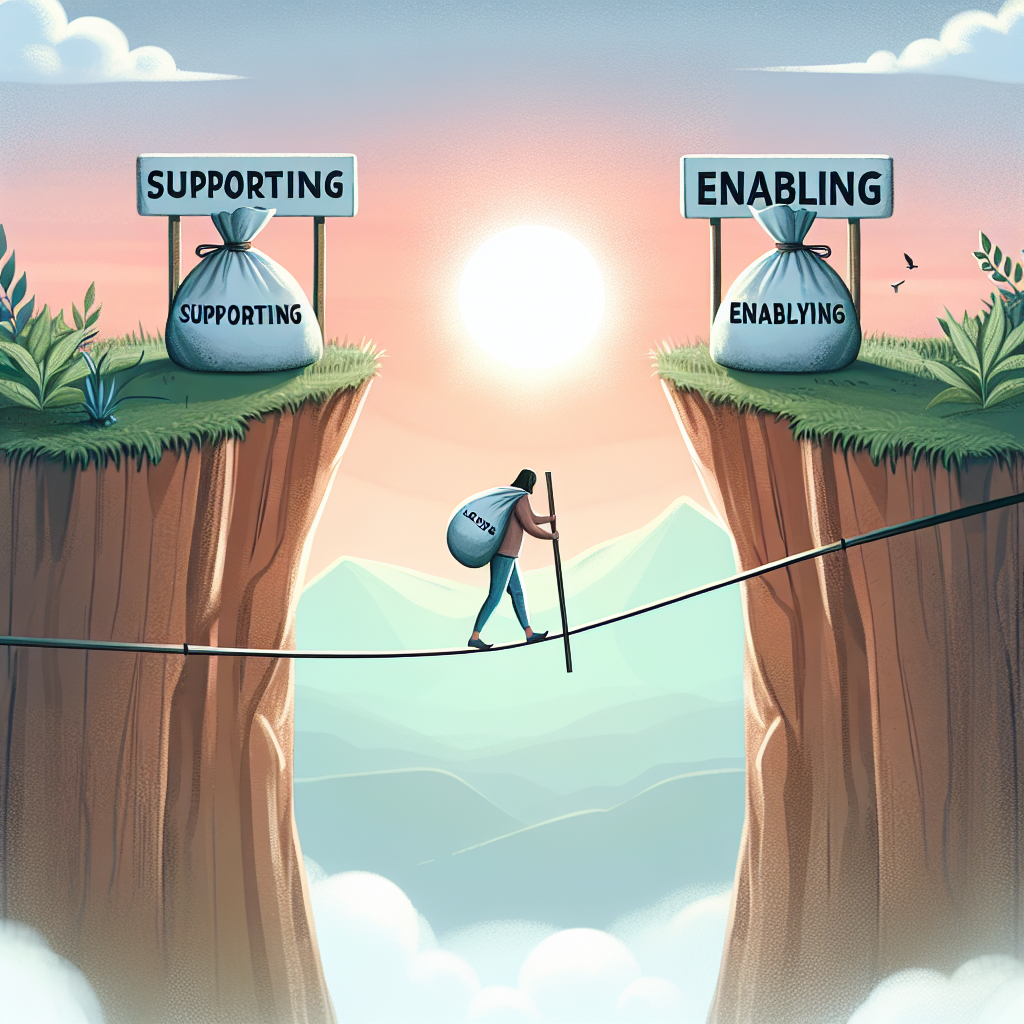-
Table of Contents

“Empower Recovery: Support Without Enabling”
Introduction
Addiction recovery is a complex and challenging journey, not only for those directly affected but also for their loved ones. One of the most difficult aspects for friends and family is finding the balance between offering support and inadvertently enabling destructive behaviors. Enabling, often born out of love and a desire to help, can perpetuate the cycle of addiction by removing the natural consequences of the addict’s actions. This introduction explores the delicate equilibrium between providing meaningful assistance and fostering independence, emphasizing the importance of setting boundaries, encouraging accountability, and promoting healthy, sustainable recovery practices. By understanding the difference between helping and enabling, supporters can play a crucial role in the recovery process, offering compassion and support without compromising the addict’s journey towards sobriety and self-sufficiency.
Setting Healthy Boundaries: Supporting Loved Ones in Addiction Recovery
Supporting a loved one through addiction recovery is a journey that requires a delicate balance between offering help and avoiding enabling behaviors. Setting healthy boundaries is crucial in this process, as it ensures that your support is constructive and not detrimental to their recovery. Understanding the difference between helping and enabling is the first step in establishing these boundaries. Helping involves actions that promote independence and responsibility, while enabling often means removing consequences and inadvertently encouraging the addiction.
One of the most important aspects of setting healthy boundaries is clear communication. Open and honest conversations about expectations, limits, and the support you are willing to provide can prevent misunderstandings and resentment. It is essential to express your concerns and intentions with empathy, ensuring that your loved one understands that your boundaries are set out of love and a desire for their well-being. This approach fosters a supportive environment where they feel respected and understood, rather than controlled or judged.
Another key element in setting boundaries is consistency. Once you have established what you are willing to do and what you are not, it is vital to stick to these limits. Consistency helps build trust and reliability, which are crucial for someone in recovery. It also reinforces the idea that actions have consequences, a lesson that is often blurred in the throes of addiction. By maintaining consistent boundaries, you help your loved one develop a sense of accountability and self-discipline, which are essential for long-term recovery.
In addition to communication and consistency, self-care plays a significant role in setting healthy boundaries. Supporting someone in addiction recovery can be emotionally and physically draining. It is important to take care of your own needs and well-being to avoid burnout and maintain a positive and supportive presence. This might involve seeking support from friends, family, or support groups, engaging in activities that bring you joy, and setting aside time for rest and relaxation. By prioritizing your own health, you are better equipped to provide the support your loved one needs.
Moreover, educating yourself about addiction and recovery can empower you to set more effective boundaries. Understanding the nature of addiction, the challenges of recovery, and the strategies that promote healing can help you make informed decisions about how to support your loved one. This knowledge can also provide you with the confidence to enforce boundaries, knowing that they are based on best practices and not just personal feelings or societal pressures.
It is also important to recognize that setting boundaries is not a one-time event but an ongoing process. As your loved one progresses in their recovery, their needs and your role may change. Regularly reassessing and adjusting your boundaries ensures that they remain relevant and effective. This flexibility demonstrates your commitment to their recovery journey and your willingness to adapt to their evolving needs.
Ultimately, setting healthy boundaries is about finding a balance between offering support and fostering independence. It is about showing love and compassion while encouraging responsibility and growth. By communicating openly, remaining consistent, prioritizing self-care, educating yourself, and being flexible, you can provide the support your loved one needs without enabling their addiction. This balanced approach not only aids in their recovery but also strengthens your relationship, creating a foundation of trust, respect, and mutual support.
Encouraging Accountability: Strategies to Help Without Enabling in Addiction Recovery
Encouraging accountability in addiction recovery is a delicate balance that requires compassion, understanding, and firmness. It is essential to support loved ones struggling with addiction without enabling their destructive behaviors. This balance can be challenging to achieve, but with the right strategies, it is possible to foster an environment that promotes recovery and personal responsibility.
One of the most effective ways to encourage accountability is by setting clear and consistent boundaries. Boundaries are crucial because they define acceptable behaviors and establish consequences for crossing those lines. For instance, if a loved one is living in your home, you might set a rule that they must attend regular therapy sessions or support group meetings. By enforcing these boundaries, you communicate that while you support their recovery, you will not tolerate behaviors that undermine it.
In addition to setting boundaries, it is important to communicate openly and honestly. Conversations about addiction and recovery can be difficult, but they are necessary for fostering accountability. Express your concerns and expectations clearly, and listen to your loved one’s perspective. This open dialogue helps build trust and ensures that both parties understand the importance of the recovery process.
Another strategy to help without enabling is to encourage self-sufficiency. While it is natural to want to help a loved one in need, doing too much for them can hinder their progress. Instead of solving their problems, guide them in finding solutions themselves. For example, if they are struggling to find a job, offer to help them with their resume or practice interview skills, but let them take the lead in the job search. This approach empowers them to take responsibility for their actions and decisions.
Moreover, it is essential to educate yourself about addiction and recovery. Understanding the complexities of addiction can help you provide better support and avoid enabling behaviors. Attend support groups for families of addicts, read books, and seek advice from professionals. The more informed you are, the better equipped you will be to navigate the challenges of supporting a loved one in recovery.
Encouraging healthy habits and routines is another way to promote accountability. Help your loved one develop a structured daily routine that includes activities such as exercise, healthy eating, and hobbies. These positive habits can provide a sense of stability and purpose, which are crucial for long-term recovery. Additionally, encourage them to build a support network of friends, family, and professionals who can offer guidance and encouragement.
It is also important to recognize and celebrate progress, no matter how small. Recovery is a long and challenging journey, and acknowledging achievements can boost motivation and self-esteem. Celebrate milestones such as attending a certain number of meetings, reaching a sobriety anniversary, or achieving personal goals. These celebrations reinforce the idea that recovery is possible and worth the effort.
Lastly, take care of yourself. Supporting someone in addiction recovery can be emotionally and physically draining. Ensure that you have your own support system and engage in self-care activities. By maintaining your well-being, you will be better able to provide the support your loved one needs without becoming overwhelmed or resentful.
In conclusion, encouraging accountability in addiction recovery involves a combination of setting boundaries, open communication, promoting self-sufficiency, educating yourself, fostering healthy habits, celebrating progress, and taking care of yourself. By implementing these strategies, you can support your loved one’s recovery journey without enabling their addiction, ultimately helping them build a healthier and more fulfilling life.
Q&A
1. **Question:** How can you support a loved one in addiction recovery without enabling their behavior?
**Answer:** You can support a loved one in addiction recovery by setting clear boundaries, encouraging them to seek professional help, and offering emotional support without providing financial assistance or covering up their mistakes.
2. **Question:** What are some signs that you might be enabling someone’s addiction?
**Answer:** Signs of enabling someone’s addiction include making excuses for their behavior, giving them money, taking over their responsibilities, and ignoring or denying the severity of their addiction.
Conclusion
To help without enabling in addiction recovery, it is crucial to set clear boundaries, offer emotional support, and encourage personal responsibility. Providing resources for professional help, such as therapy or support groups, while avoiding actions that shield the individual from the consequences of their behavior, fosters a supportive yet accountable environment. This balanced approach promotes long-term recovery and self-sufficiency.



